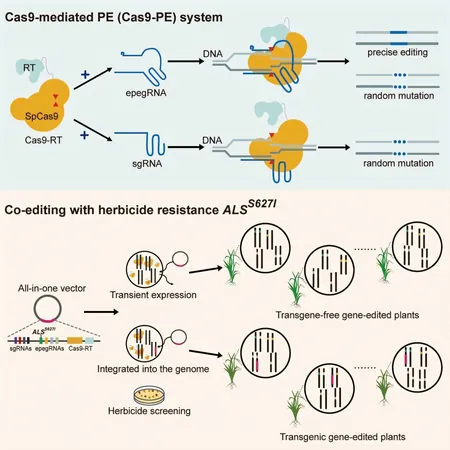
Breakthrough Gene Editing Technique Transforms Rice Breeding: Meet the Game-Changing Cas9-PE System!
2024-11-20
Author: Ming
Introduction
In the world of modern agriculture, the quest for efficient and precise gene editing tools has become paramount. Researchers have long sought to achieve diverse mutation types across multiple genomic sites to enhance crop resilience and yield. A pivotal advancement in this arena comes from prime editing (PE) technology, known for its precision in introducing base substitutions and small insertions or deletions. However, achieving consistent efficiency across different editing locations in a single plant presents a significant hurdle for scientists.
The Cas9-PE System
Enter the groundbreaking Cas9-PE system, developed by a collaboration led by Li Jiayang at the Institute of Genetics and Developmental Biology (IGDB) of the Chinese Academy of Sciences. This innovative multiplex gene editing tool is revolutionizing rice breeding by enabling simultaneous precise editing and site-specific random mutagenesis.
Demonstration of Technology
In a striking demonstration of this technology, the research team modified the ALSS627I gene, which provides resistance to the herbicide bispyribac-sodium (BS), creating transgene-free rice plants in the first generation (T0). Through Agrobacterium-mediated transient transformation, they achieved remarkable results, showcasing how the Cas9-PE system not only facilitates precise genetic edits but also introduces targeted randomness that can lead to unexpected and advantageous traits.
Dual Capabilities of Cas9-PE
The study, recently published in Trends in Biotechnology, illustrates the dual capabilities of the Cas9-PE system. In crop breeding, while precise edits target desirable traits, the introduction of random mutations can be equally beneficial. These random mutations can disrupt regulatory genes responsible for undesirable characteristics, ultimately driving the emergence of superior crop variants.
Previous Findings and Results
Building on previous findings that demonstrated the importance of the S627I site in the endogenous acetolactate synthase (ALS) gene for conferring BS resistance, the researchers utilized the Cas9-PE system to achieve multiplex edits to the ALSS627I. Out of 23 rice plants generated, seven exhibited successful edits at the critical ALSS627I site. Impressively, three of these plants not only maintained transgene-free statuses but also showcased precise editing alongside random mutations at other target genes, setting the stage for a new era in rice crop improvement.
Conclusion
With the Cas9-PE system, the future of agricultural biotechnology looks promising, unlocking new pathways for developing robust crops that can withstand the pressures of climate change and food security challenges. This revolutionary tool stands as a testament to human ingenuity and the relentless pursuit of innovation in food production. Stay tuned as this technology unfolds, potentially changing the landscape of crop breeding forever!
 Brasil (PT)
Brasil (PT)
 Canada (EN)
Canada (EN)
 Chile (ES)
Chile (ES)
 España (ES)
España (ES)
 France (FR)
France (FR)
 Hong Kong (EN)
Hong Kong (EN)
 Italia (IT)
Italia (IT)
 日本 (JA)
日本 (JA)
 Magyarország (HU)
Magyarország (HU)
 Norge (NO)
Norge (NO)
 Polska (PL)
Polska (PL)
 Schweiz (DE)
Schweiz (DE)
 Singapore (EN)
Singapore (EN)
 Sverige (SV)
Sverige (SV)
 Suomi (FI)
Suomi (FI)
 Türkiye (TR)
Türkiye (TR)